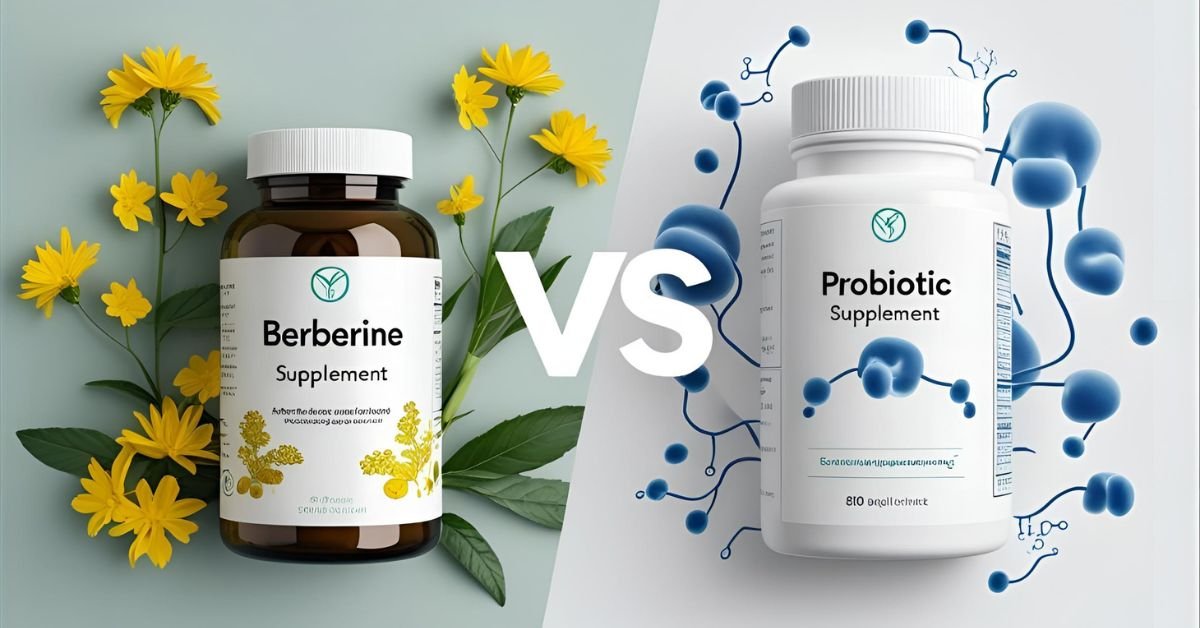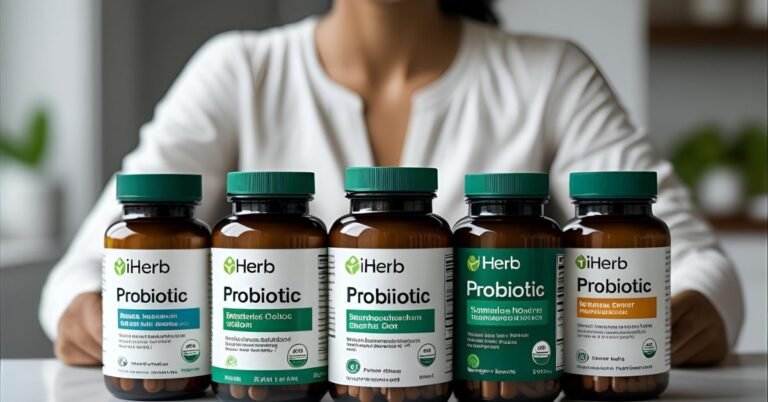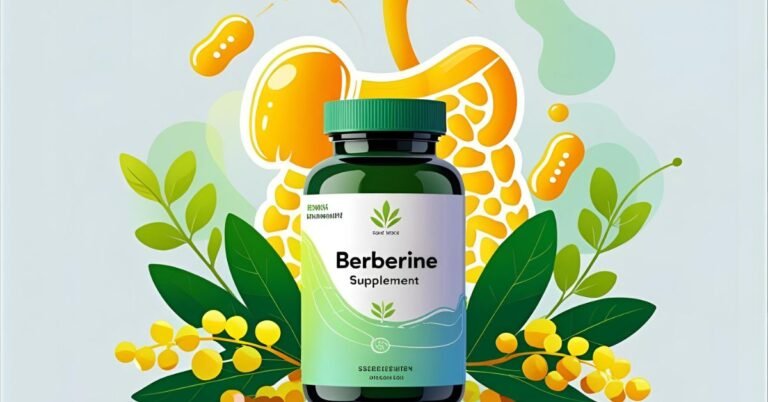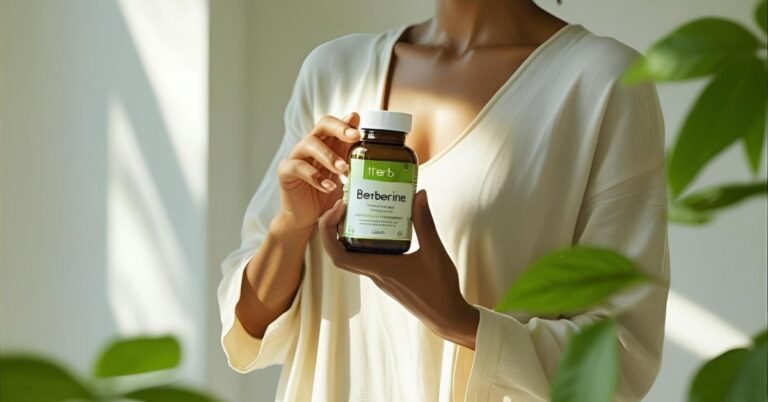Which is Better for Your Gut Health? A 2-Step Guide to Berberine vs Probiotics⚔️
If you’re on a journey to improve your gut health, you’ve likely heard of two powerful supplements: Berberine and Probiotics. Both are praised for their digestive benefits, but they work in fundamentally different ways. This leads to a critical question: Which is better for your gut health—a potent plant compound or a dose of beneficial live bacteria?
Navigating the world of supplements can be confusing. Understanding the unique roles of Berberine and Probiotics is the key to making an informed choice for your specific health goals.
This guide will break down the science behind both supplements, compare their functions head-to-head, and help you solve the problem of which one to choose for a happier, more balanced gut. 👇
Table of Contents
🌿 What is Berberine? The Gut’s “Gardener”
Berberine is a bioactive compound extracted from several different plants, including a group of shrubs called Berberis. Think of Berberine as your gut’s “gardener.” Its primary role is to help “weed out” the bad stuff.

Scientifically, Berberine has powerful antimicrobial properties. A study from the journal Frontiers in Cellular and Infection Microbiology highlights that Berberine can selectively inhibit the growth of harmful bacteria in the gut while leaving many beneficial species unharmed.
Beyond this, Berberine is famous for its profound metabolic benefits, particularly in supporting healthy blood sugar levels.
Key Functions:
- Selectively fights overgrowths of “bad” gut bacteria and yeast.
- Supports a healthy inflammatory response in the gut lining.
- Significantly aids in maintaining healthy blood sugar and metabolic function.
If you’re looking for a high-quality option, our guide to the Best Berberine Supplement on iHerb can help you choose.
🦠 What are Probiotics? The Gut’s “Seeders”
Probiotics are the “good guys.” They are live, beneficial bacteria that, when consumed, help to seed your gut with a healthy and diverse population of microbes. Understanding their role is essential when asking which is better for your gut health. If Berberine is the gardener that pulls the weeds, probiotics are the seeds you plant in the garden afterward.

According to the National Center for Complementary and Integrative Health (NIH), probiotics can help maintain a healthy community of microorganisms and have a wide range of benefits.
Key Functions:
- Replenish and increase the population of beneficial bacteria.
- Crowd out harmful microbes, leaving less room for them to grow.
- Support a healthy immune system (since much of it resides in the gut).
Choosing the right strains is crucial, which we cover in our guide to the 5 Best Probiotic Supplements on iHerb.
⚔️ Berberine vs Probiotics: A Head-to-Head Comparison
| Feature | Berberine (The Gardener) | Probiotics (The Seeders) |
| Primary Action | Antimicrobial: Kills/inhibits bad bacteria & yeast. | Replenishing: Adds good bacteria to the gut. |
| Best For | Addressing gut dysbiosis (imbalances), SIBO-like symptoms, and metabolic support. | General gut maintenance, post-antibiotic recovery, immune support. |
| Analogy | Weeding the garden. | Planting new seeds. |
| Mechanism | A single plant compound. | Live bacterial organisms. |
Export to Sheets
🤔 Problem-Solving: Answering “Which is Better for Your Gut Health?”
The answer depends entirely on your specific problem. Let’s determine which is better for your gut health based on your goals.

You might choose Berberine if…
- You suspect an overgrowth of bad bacteria (dysbiosis), with symptoms like excessive bloating, gas, and discomfort.
- You are also focused on supporting your metabolic health and maintaining healthy blood sugar levels.
- You feel like your gut needs a “reset” before you start rebuilding with good bacteria.
You might choose Probiotics if…
- Your goal is general gut health maintenance and promoting a diverse microbiome.
- You have recently taken a course of antibiotics.
- You are looking to support your immune system and overall digestive regularity.
- You have a relatively healthy baseline but want to optimize your gut flora.
🤝 Can You Take Berberine and Probiotics Together?
Yes, and this is often a very effective strategy. However, timing is key. Because Berberine is antimicrobial, you should not take it at the exact same time as the Berberine could kill some of the beneficial bacteria in the probiotic supplement.
A common strategy recommended by functional medicine practitioners is:
- Take Berberine with your meals (e.g., morning and evening).
- Take your Probiotic on an empty stomach, either first thing in the morning or right before bed, at least 2 hours apart from the Berberine.
This allows the “gardener” (Berberine) and the “seeder” (Probiotics) to work without interfering with each other.
❓ Frequently Asked Questions (FAQ)
Q: When trying to decide which is better for your gut health, where should I start? A: Start by identifying your primary symptoms. If you suspect a microbial overgrowth (common with bloating and gas), consider Berberine first. For general maintenance, recovery after antibiotics, or immune support, a high-quality Probiotic is an excellent starting point.
Q: Which is better for bloating, Berberine or Probiotics? A: It depends on the cause. If bloating is from an overgrowth of bad bacteria, Berberine might be more effective initially to address the root cause. If it’s from a lack of good bacteria, Probiotics would be the better choice. Many find that using Berberine first, followed by Probiotics, is the most effective long-term solution.
Q: How long should I take Berberine? A: Berberine is typically used for shorter cycles, often for 4-8 weeks, followed by a break. It’s best to consult with a healthcare professional for personalized advice. Probiotics, on the other hand, can generally be taken for long-term maintenance.
Q: Is Berberine a probiotic? A: No. Berberine is a plant-based chemical compound with antimicrobial properties. Probiotics are live, beneficial microorganisms.
🚀 Final Thoughts: Your Strategic Choice
So, which is better for your gut health? The debate isn’t about which supplement is superior overall, but which is the right tool for your current situation.
- Choose Berberine to help “weed” and rebalance an unruly gut.
- Choose Probiotics to “seed” and maintain a flourishing gut garden.
By understanding their different roles, you can move beyond confusion and create a smart, targeted supplement strategy. For a foundational approach to wellness, start by learning how to improve gut health.
(As an affiliate, we may earn a commission from qualifying purchases at no extra cost to you. We only recommend products we trust.)
About the Author
This article was written and medically reviewed by the BellyBrainBed Editorial Team. Our team is composed of certified health coaches, nutritionists, and sleep science enthusiasts dedicated to providing accurate, evidence-based information to help you achieve optimal wellness. We believe in transparency and trust, and every piece of content is rigorously checked to meet our high E-E-A-T standards. [Learn more about our editorial process]






